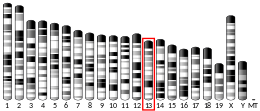Interleukine 9
L'interleukine 9 est une chimiokine de type interleukine. Son gène est IL9 situé sur le chromosome 5 humain.
| IL9 | |||||||||||||||||||||||||||||||||||||||||||||||||||
|---|---|---|---|---|---|---|---|---|---|---|---|---|---|---|---|---|---|---|---|---|---|---|---|---|---|---|---|---|---|---|---|---|---|---|---|---|---|---|---|---|---|---|---|---|---|---|---|---|---|---|---|
| Identifiants | |||||||||||||||||||||||||||||||||||||||||||||||||||
| Aliases | IL9, Interleukine 9 | ||||||||||||||||||||||||||||||||||||||||||||||||||
| IDs externes | OMIM: 146931 MGI: 96563 HomoloGene: 492 GeneCards: IL9 | ||||||||||||||||||||||||||||||||||||||||||||||||||
| |||||||||||||||||||||||||||||||||||||||||||||||||||
| |||||||||||||||||||||||||||||||||||||||||||||||||||
| |||||||||||||||||||||||||||||||||||||||||||||||||||
| |||||||||||||||||||||||||||||||||||||||||||||||||||
| |||||||||||||||||||||||||||||||||||||||||||||||||||
| Wikidata | |||||||||||||||||||||||||||||||||||||||||||||||||||
| |||||||||||||||||||||||||||||||||||||||||||||||||||
Elle est sécrétée essentiellement par certains lymphocytes T helper appelés, pour cette raison, lymphocytes Th9[5] ainsi que par les Th2, les Th17 et le lymphocytes T régulateurs[6].
Rôles
modifierElle agit par l'intermédiaire de sa fixation sur un récepteur spécifique, l'IL9R[7].
Elle joue un rôle dans l'inflammation par l'intermédiaire des lymphocytes Th17[8]. Elle augmente l'expression des interleukines 4, 5 et 13 entraînant une exacerbation de l'asthme sur un modèle animal de cette maladie[9].
Son taux est augmenté en cas de syndrome coronarien aigu[10] ainsi que chez les patients porteurs d'un athérome carotidien[11] avec un rôle probablement aggravant sur l'athérome[12].
Son expression est augmentée par le facteur de transcription PU1[13].
Les cellules Th9 ont par ailleurs un rôle d'immunité anti-tumorale en stimulant les lymphocytes CD8[14], bien que l'interleukine 9 ait un rôle probable dans la tumorigénèse[15].
Cette interleukine participe à la résistance à certains parasites[16].
Notes et références
modifier- GRCh38: Ensembl release 89: ENSG00000145839 - Ensembl, May 2017
- GRCm38: Ensembl release 89: ENSMUSG00000021538 - Ensembl, May 2017
- « Publications PubMed pour l'Homme », sur National Center for Biotechnology Information, U.S. National Library of Medicine
- « Publications PubMed pour la Souris », sur National Center for Biotechnology Information, U.S. National Library of Medicine
- Jia L, Wu C, Differentiation, regulation and function of th9 cells, Adv Exp Med Biol, 2014;841:181–207
- Noelle RJ, Nowak EC, Cellular sources and immune functions of interleukin-9, Nat Rev Immunol, 2010;10:683–687
- Renauld JC, Druez C, Kermouni A et al. Expression cloning of the murine and human interleukin 9 receptor cDNAs, Proc Natl Acad Sci USA, 1992;89:5690–5694
- Nowak EC, Weaver CT, Turner H et al. IL-9 as a mediator of Th17-driven inflammatory disease, J Exp Med, 2009;206:1653–1660
- Temann UA, Ray P, Flavell RA, Pulmonary overexpression of IL-9 induces Th2 cytokine expression, leading to immune pathology, J Clin Invest, 2002;109:29–39.
- Lin YZ, Wu BW, Lu ZD et al. Circulating Th22 and Th9 levels in patients with acute coronary syndrome, Mediators Inflamm, 2013;2013:635672
- Gregersen I, Skjelland M, Holm S et al. Increased systemic and local interleukin 9 levels in patients with carotid and coronary atherosclerosis, PLoS ONE, 2013;8:e72769
- Zhang W, Tang T, Nie Det al. IL-9 aggravates the development of atherosclerosis in Apoe−/− mice, Cardiovasc Res, 2015;106:453–464
- Chang HC, Sehra S, Goswami R et al. The transcription factor PU.1 is required for the development of IL-9-producing t cells and allergic inflammation, Nat Immunol, 2010;11:527–534
- Lu Y, Hong S, Li H et al. Th9 cells promote antitumor immune responses in vivo, J Clin Invest, 2012;122:4160–4171
- Knoops L, Renauld JC, IL-9 and its receptor: from signal transduction to tumorigenesis, Growth Factors, 2004;22:207–215
- Faulkner H, Humphreys N, Renauld JC, Van Snick J, Grencis R, Interleukin-9 is involved in host protective immunity to intestinal nematode infection, Eur J Immunol, 1997;27:2536–2540




